It’s early September at Segal Ranch in Grandview, Washington, and farmhands are reaping verdant rows of ripe hops. But I’m inside the farm’s main office, ready to perform another important task: tasting the salsa.
As I stand inside the ranch’s cramped kitchen, where owner John Segal Jr. is stirring refried beans on the stove, office manager Delia Ramos extends a bowl of the crimson condiment. Segal and I scoop some up with tortilla chips. The salsa is warm with a low-simmering heat. I go back for a second chip. “It’s good for gringos,” Ramos says, smiling. The salsa is just one component to Segal Ranch’s annual harvest tradition, a taco party.
There’s an old saying in winemaking that it takes a lot of great beer to make great wine. But in the brewing industry, it takes plenty of great tacos to make great beer. During harvest, Yakima Valley hop farms invite brewers to their ranches to hand-select hop varieties, treating them to tacos and tamales every bit as memorable as just-picked Citra hops.
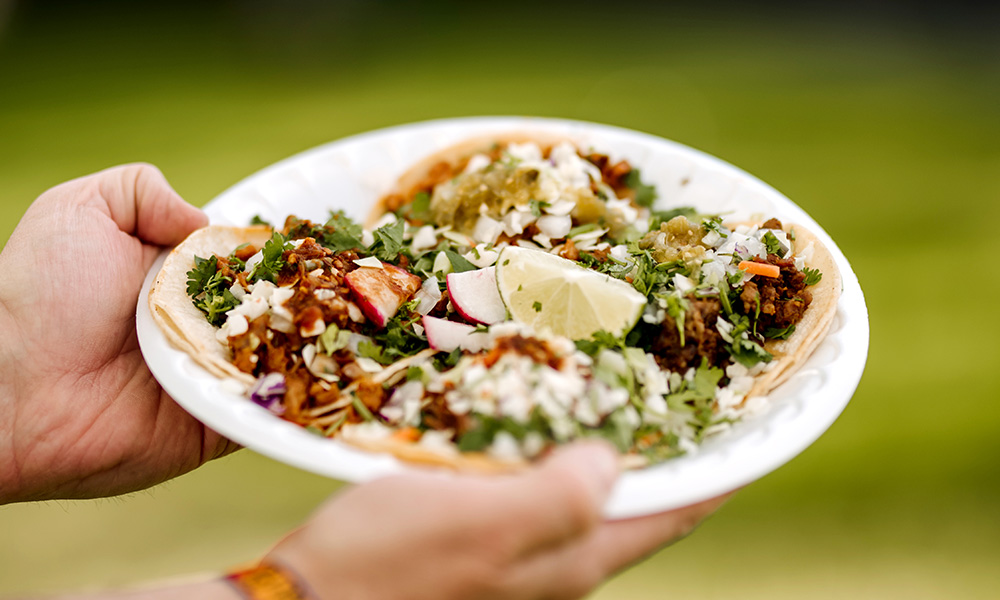
[Related on CraftBeer.com: Taco Tuesday!]
Segal Ranch started its taco party tradition in 2010 to help sell the story, and hop quality, of the family-run farm. Segal invited former Lagunitas Brewing owner Tony Magee and Jeremy Marshall, the brewmaster, to tour the farm, select hops, eat Mexican food, and listen to a mariachi band. Seeing the farm up close, tacos in hand, turned a transaction into a lasting relationship.
News spread, and soon Russian River, Allagash, Bell’s, and other breweries were heading to Segal Ranch to mix business with salsa made from peppers grown on the farm by manager Martin Ramos, who also grows and breeds Segal’s hops. (He’s Delia’s brother.) Today is the first of the season’s 11 taco parties, including visits from Tree House, Great Lakes, and Firestone Walker, all of which buy hops from Segal. An Odell Brewing contingent will arrive soon, the tacos helping Segal create a lasting bond wrapped in Delia’s handmade tortillas.
“I tell brewers that it’s like going to a farmers’ market in August and everyone has good tomatoes,” Segal says. “But then you get to know one family that grows very good tomatoes and you want to do business with them.”
The Rise of Yakima Hops
I arrive hungry and curious in the Yakima Valley, struck by the landscape’s arid expanses punctuated by lush hop fields. After grabbing a quartet of tasty tacos, including birria and al pastor, at Javi’s Chicken and Churros in Sunnyside, I dig into history. The Yakima Valley was once a sagebrush-covered desert landscape with around 300 days of sunshine and minimal rainfall. The first irrigation ditch arrived in 1864, and settlers transformed the region into an agricultural powerhouse producing apples, grapes, pears, cherries, and hops. The foundational beer ingredient took root in the early 1870s, and today the Yakima Valley accounts for some 75 percent of America’s hop production.
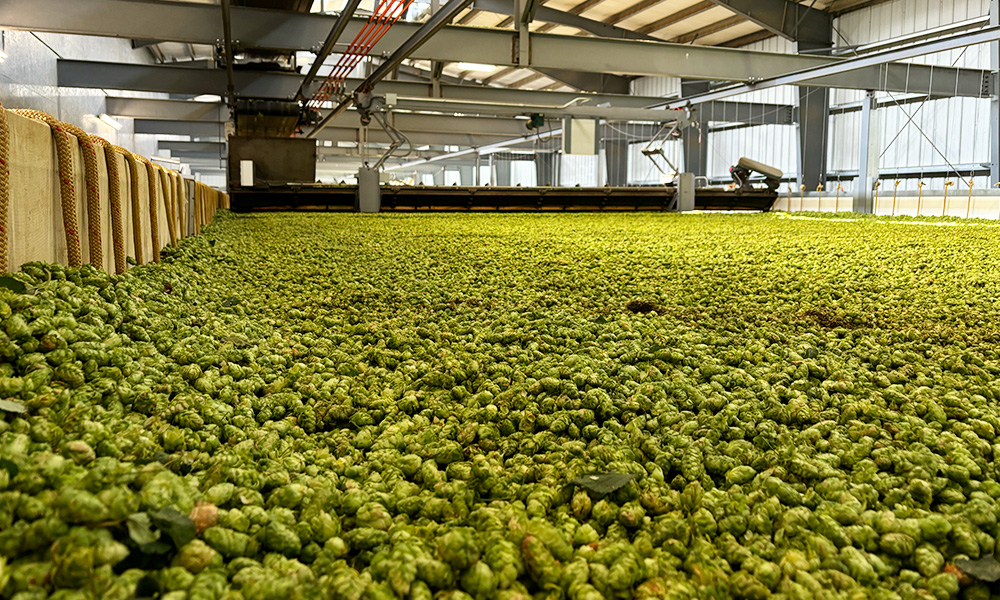
Harvest typically begins in late August, kicking off an around-the-clock rush that lasts about a month. Historically, hop farms relied on a largely Mexican migrant workforce that followed the harvests, typically winding a route from Texas to California and Washington to pick produce along with plentiful Pacific Northwest hops. (Tightening border restrictions, aging laborers, and competing job opportunities have led to labor shortages. To shore up the ranks, hop farms hire seasonal workers, many from Mexico, who travel to America on temporary H-2A visas and return after the harvest.)
Today, Yakima County’s population is more than 50 percent Hispanic. With all of these migrants came really great Mexican food, and Yakima Valley now features best-in-class taco trucks and restaurants. Los Hernández Tamales, in Union Gap, Washington, won a James Beard Award for its tamales made with cactus and locally grown asparagus.
Los Panchos, a tiny shack tucked off the main drag in Toppenish, is a favorite of Alexandra Nowell, a cofounder and brewer at the forthcoming Mellotone Beer Project in Cincinnati. “The tacos were some of the best I’ve had in my countless trips to Yakima,” she says. “Pollo is their specialty, and they’re grilling it over wood outside.”
I spot the sidewalk fire when I visit, and the chicken tacos are as advertised. A crunchy, textural mix of fire-charred chicken is set on supple handmade tortillas no bigger than my palm. I could devour them daily and never tire of those tacos.
Beans, Meat & Beers
For both brewers and drinkers, tacos serve as much-needed sustenance. After downing stellar afternoon double IPAs at Varietal Beer, an IPA specialist in Sunnyside, I need more tacos to balance things out. Co-owner and head brewer Chris Baum steers me to Tacos El Pellon II, a truck located in a nearby O’Reilly Auto Parts parking lot. “That’s where I usually take everybody,” he says. “The trifecta is cabeza, carnitas, and chicharrón.” I follow orders. The tacos are topped with pinto beans and crunchy slivers of iceberg lettuce, a warm-cool contrast to the crispy meat. The tacos are also served with a plank of cotija cheese that I nibble on as I head about 30 miles northwest to Loza Farms in Wapato, Washington.
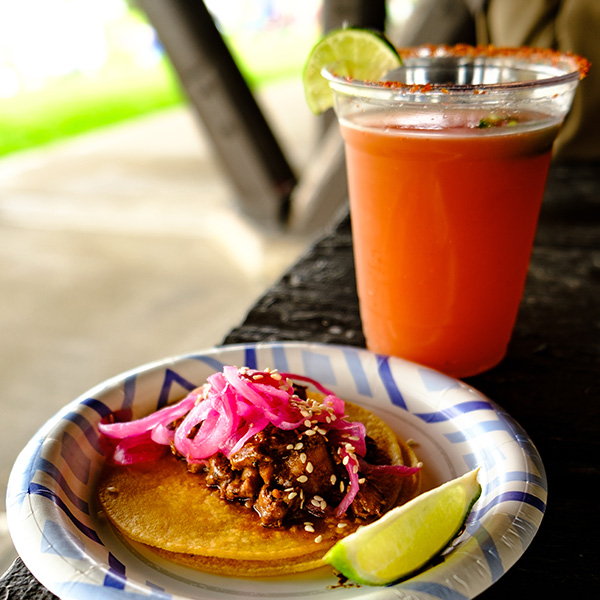
“The Mexican food in Yakima is, bar none, some of the best Mexican food you will ever have,” says farm manager Leon “Junior” Loza. Junior’s father first came to the Yakima Valley from Mexico in 1976, eventually purchasing a 56-acre hop farm in 2006. Loza Farms now encompasses 360 acres, where America’s only Hispanic-owned hop farm produces Comet and Citra hops used by breweries across the U.S., including Cellarmaker and Other Half.
Junior is one of four siblings to work the farm, and today he’s flitting between Spanish and English on his walkie-talkie, tackling harvest hiccups while showing me the grounds. “Right now we’re in Amarillos,” he says, pointing to the hanging bines heading to the picking machine that will separate cones from leaves and other vegetal matter. The machinery is a mechanical ballet, full of whirring belts and conveyors delivering the plump cones to kilns to dry.
Loza’s multi-million-dollar picking machine is a pricey, persnickety employee. Motors malfunction. Shafts break. The farm fabricates replacement parts to minimize costs and downtime. “We’re 30 minutes from any place that sells parts,” says Junior, who has worked every harvest since he was 13. (He’s now 42.) “Any way you can bring down costs, it’s a dollar more to spend somewhere else.” That could mean paying workers overtime, which farms are trying to minimize, or supplying housing for workers.
The farm’s Mexican heritage draws from Mexican craft breweries such as Cerveza Minerva and Morenos during harvest. “Seeing them here at our farm is super exciting for us, especially since my parents were born in Mexico,” Junior says. “It’s cool to see a product that they came to Mexico to grow, return back to Mexico in beer.”
To celebrate, Loza Farm hosts a party for Mexican breweries in town for hop selection, and breweries from as far afield as Italy and New Zealand attend, too. Tacos are served, as well as surprises like a trained opera singer-turned-brewer belting tunes. “It becomes a potluck of beers with food,” he says.
Drinking on the Job Site
Drinking beer at a hop farm is not common. Hop farms are, first and foremost, agricultural operations. But wineries are located in vineyards. Why are breweries not headquartered at hop farms? One exception is Bale Breaker Brewing, located about 20 miles northeast of Loza in Yakima, where I head next for, yes, more tacos and IPAs.
Bale Breaker’s brewery and taproom is carved from a hop field at Loftus Ranches, which dates to 1932. Siblings and Loftus scions Kevin Smith and Meghann Quinn, along with Meghann’s husband, Kevin Quinn, run the brewery where their homegrown hops are celebrated in the IPAs Bottomcutter and Topcutter. They’re named after the machines that cut hop bines from the plant’s base and the top that’s attached to a trellis.
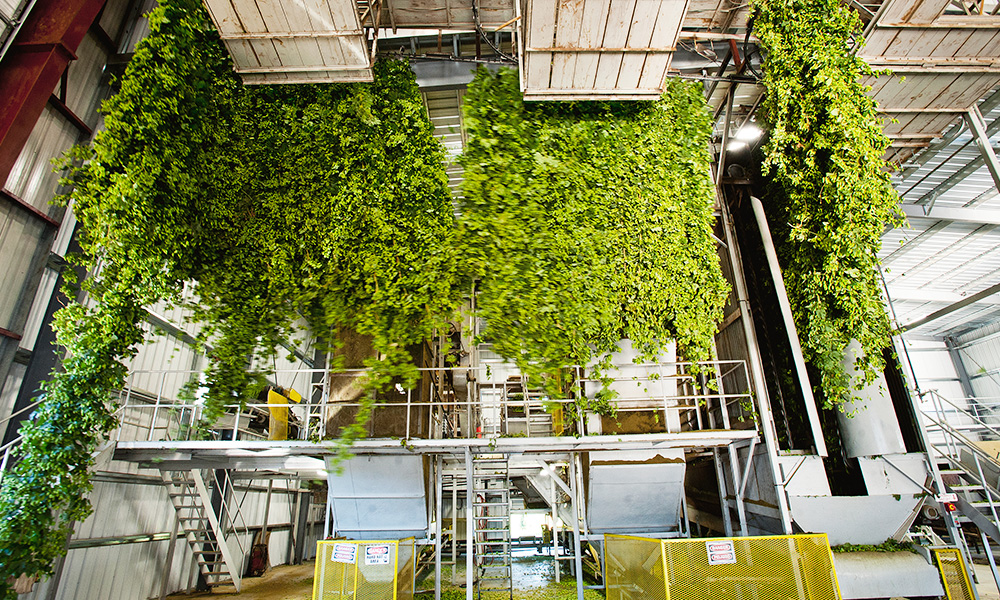
“Sometimes when we open our windows in the morning, you can tell when [we’re picking different] hop varieties,” Meghann says of the harvest.
Bale Breaker is in the middle of a hectic stretch of brewing fresh-hop beers, at least a dozen, collaborations included, that will drop throughout September and October. None are ready yet, but I do try an IPA brewed with zesty, tropical Krush hops, one of the newest hop varieties.
The IPA is a great companion to my crispy quesabirria tacos, a mix of tender stewed beef and mild melted cheese, from the That Guy That Cooks food truck stationed outside. Those might be my ninth or eighth tacos today. At this point, keeping count is futile.
Clients Love Tacos
Around the Yakima Valley, tacos are not just ballast for drinking your body weight in IPAs. One morning, when I arrive at Morrier Ranch, a 500-acre Yakima farm that has grown hops since 1904, Liz Morrier McGree has a plate of tacos ready for me at 10:45 a.m. They’re from a taco truck that arrives daily for the ranch workers’ lunch break.
At nearby CLS Farms, which oversees 2,400 acres and 27 hop varieties, including proprietary El Dorado and the world’s largest Centennial crop, the lunch whistle sounds around 10 a.m. during harvest. A taco truck awaits.
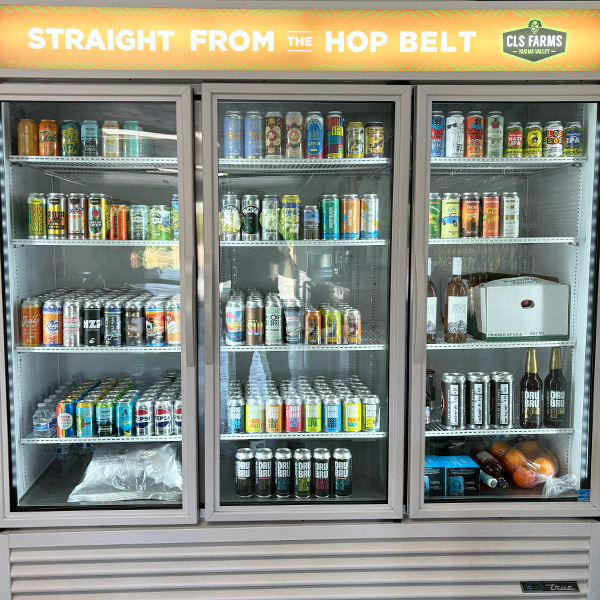
CLS has reduced acreage over the last several years and expanded into growing fruits such as apples, pears, plums, and peaches. Growing fruit keeps valuable employees gainfully employed as CLS rides the hop industry’s boom-bust roller coaster. Business soared when breweries needed hops, and lots of them, to create triple dry-hopped double IPAs. Excess is out of style, and hop acreage nationwide shrunk from a high of around 61,000 acres in 2021 to 44,000 acres this year, a rightsizing of production for a brewing industry decoding post-pandemic drinking behavior.
In a difficult brewing environment, inviting brewers to hop farms for tacos, beer, and business can foster a deeper tie, turning a necessary purchase into a memorable experience that drives repeat business each year. “This need for connection and understanding has been most meaningful to our family and farm,” said Shelley Desmarais, who co-owns CLS with her husband, Eric. CLS runs an annual harvest party at night, when the clinks, clanks, and hums of hops traveling through machinery contrast the quiet of starry darkness. “At night there’s less everything, and it’s a special time for people to come to the farm,” Desmarais said.
Back at Segal Ranch, farm manager Martin Ramos is tending the grill, searing sausages, chicken, short ribs, marinated pork riblets, and carne asada. “We do five different proteins, which I think is too much, but we’re locked into the tradition,” John Segal says.
The BBQ is a big production, but the payoff in growing a loyal clientele, one taco at a time, can be counted in acreage. When Segal started the tradition in 2010, the family farm only cultivated 83 acres and was in danger of closing; this year, it’s cultivating more than 400 acres of in-demand Cascade and Centennial hops, plus the burgeoning varieties Zumo, Anchovy, and Tangier. “The farm wouldn’t be where it is today without the barbecues,” Segal says. “Our farm-to-brewery approach has built some really good loyalty and relationships.” As has Mexican food.
A long table is soon topped with a DIY taco spread, including those beans, grilled meats, steaming handmade tortillas, and a ghost pepper salsa that singes my tongue. A cooler contains Russian River’s Pliny the Elder and Stone Brewing’s Zumology IPA that stars the lime-like Zumo hop, a recent addition at Segal. Containers of Centennial hops sit in Segal’s office, ready to be rubbed, sniffed, and selected for Odell’s flagship IPA. Business can wait. There’s plenty to talk about in the hops business, but the tacos come first.
CraftBeer.com is fully dedicated to small and independent U.S. breweries. We are published by the Brewers Association, the not-for-profit trade group dedicated to promoting and protecting America’s small and independent craft brewers. Stories and opinions shared on CraftBeer.com do not imply endorsement by or positions taken by the Brewers Association or its members.
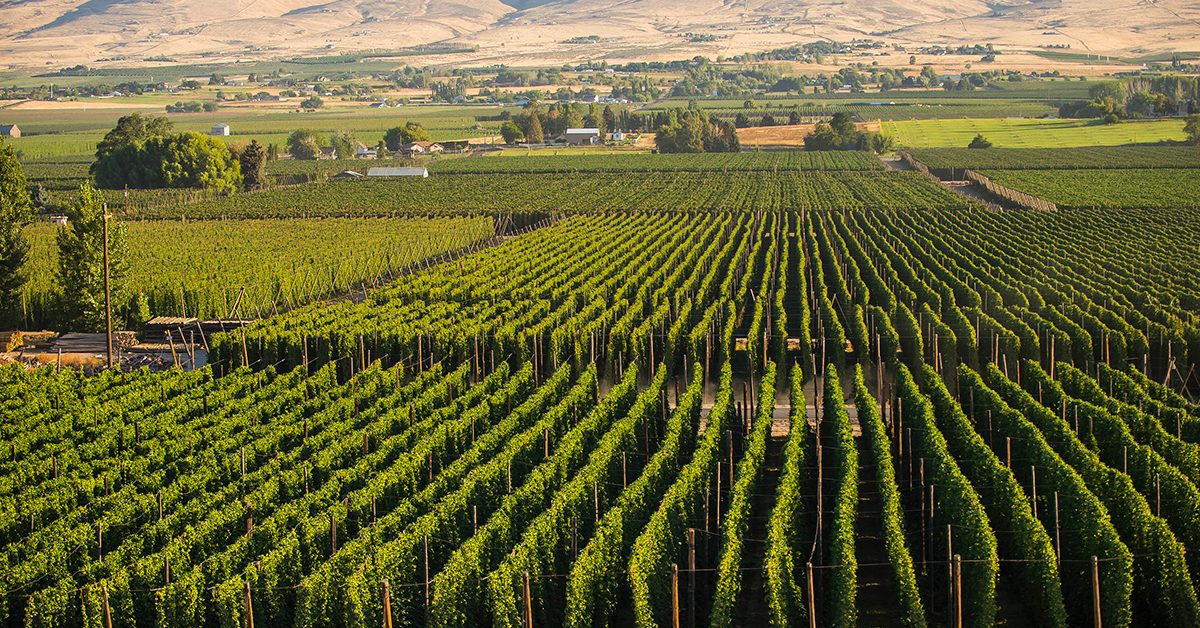

Share Post